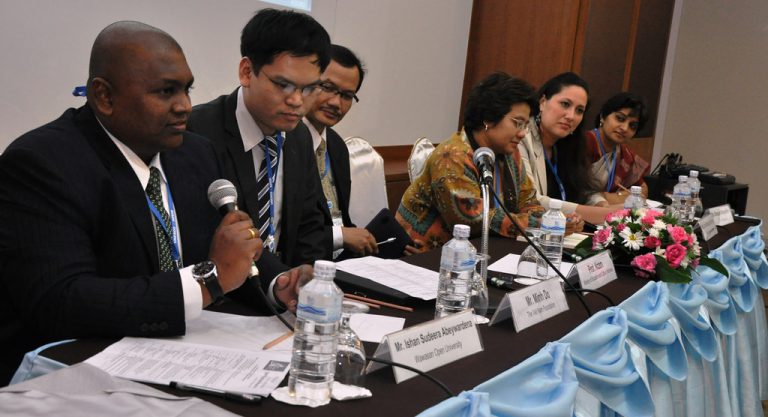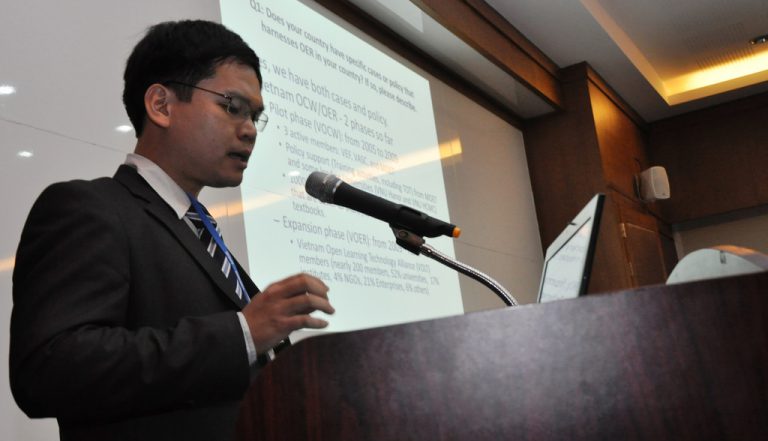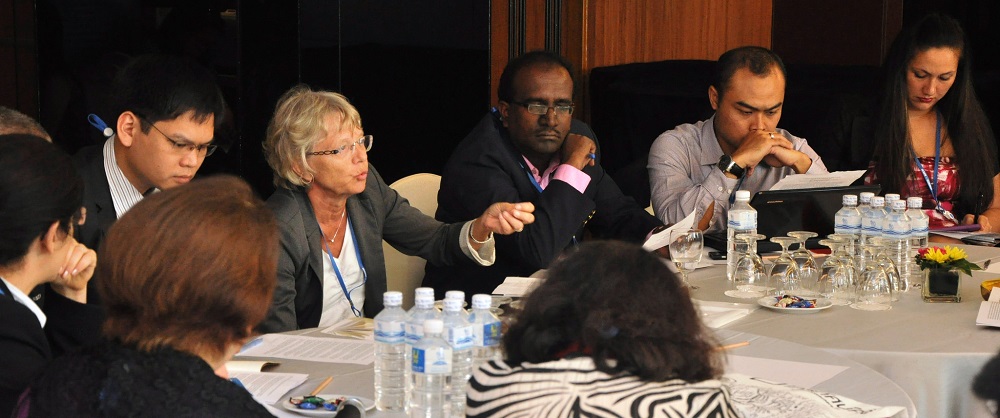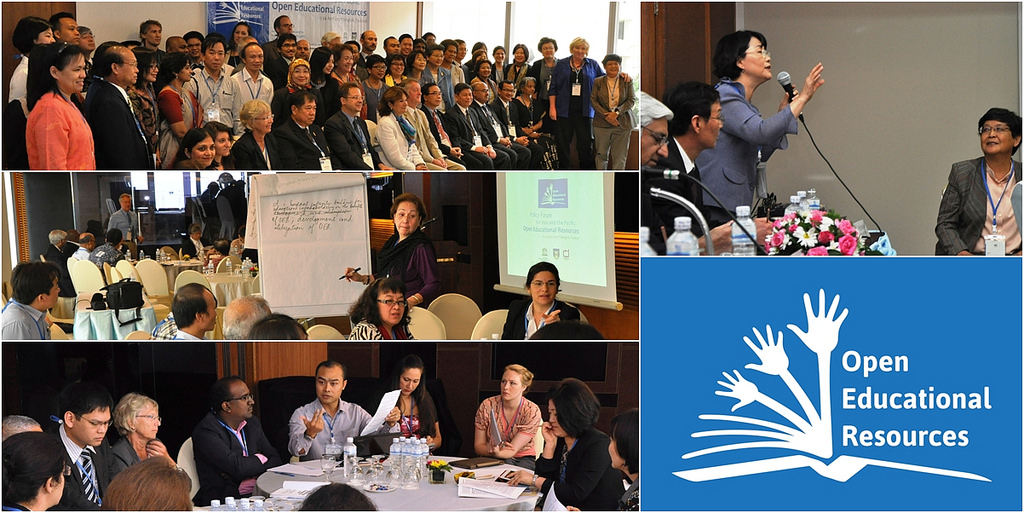On 23-24 April 2012, UNESCO, the Commonwealth of Learning (COL) and the Thai Teachers TV (TTV) organized a Policy Forum for Asia and the Pacific on Policy and Practices in Open Educational Resources in Bangkok with 74 participants from 18 countries.
“During these two days we will hear the voice of practitioners in OER, as the regional forum will focus on targeted recommendations to have solid contributions for the global Conference on OER in Paris in June 2012”, said COL President Sir John Daniel in his opening remarks. He set the frame on the purpose and scope of the regional forum and its important contributions to global discussions that shall feed into the upcoming Paris Conference. The contribution of this region Pacific region is fundamental to this discussion, as the immense growth of mega-universities in Asia “is a reason why this region is at the lead in developing open educational resources”.
Representing the host country Thailand, Churairat Sangboonnum, Secretary General of the Thai National Commission for UNESCO, said that “Open licenses can create a new learning-teaching paradigm and bring benefit to all people of different age and background.”
In a survey-based overview on OERs in Asia, Ishan Sudeera Abeywardena, Wawasan Open University, named the trends of OERs in the region, which are spreading quickly and widely, and shed light on outstanding issues, namely the lack of software integration, and limited access to computers and to internet, as well as open questions about opyright, ownership and awareness of available resources. He closed his presentation pointing out that a “culture of collaboration between the organizations needs to be established.”
“Three years ago nobody knew about OER”, said Ms. Trudi Van Wyk (COL) who presented definitions and a common understanding of OER as “freely accessible and legal to copy”. She also outlined the ‘4 Rs’ of OER as: Remix – Redistribute – Reuse – Rework. Main elements in defining OER are sharing, contribution, customization, localization, translation and contextualization.
The second day of the forum was used to further develop the circulating draft of the Declaration on OER, which will be officially released by the Paris Conference in June 2012. The working draft includes so far comments and suggestions from regional policy forums held in the Caribbean (January 2012), Africa (February 2012), Latin America (March 2012) and Europe (April 2012). After the Asia-Pacific review, the last regional forum will follow in May for the Arab States.
Participants perceived the OER initiative as very positive, but raised issues such as lack of knowledge about initiatives in other countries, the variety of licensing systems worldwide, a focus on higher education, quality issues of available materials, and lastly different copyright laws and practices.
“We need strong support from the government, from the private sector, and from non-government organizations,” said Ninnat Olanvoravuth, Secretary General of the Association of Southeast Asian Institutions of Higher Learning and participant at the workshop.
“The forum was really impressive, it has been an eye-opener for me on how most developing countries develop, implement and access OERs,” concluded Cheri Moana Robinson, National University of Samoa, another participant at the workshop.
Open Education Resources is an innovative approach to promote greater access to high quality education through freely available and adaptable teaching and learning materials at low cost. OER is defined as “teaching, learning and research materials in any medium that reside in the public domain and have been released under an open license that permits access , use, repurposing, reuse and redistribution by others with no or limited restrictions“ (Atkins, Brown & Hammond, 2007).
More information, including the 5th draft version of the Paris Declaration: oercongress.weebly.com (mở tab mới)
Presentations of the Asia-Pacific Forum: www.unescobkk.org/index.php (mở tab mới)
Meeting Programme (pdf, 180kb)
Opening Remarks by Etienne Clement, Deputy Director, UNESCO Bangkok (pdf, 160kb)
Opening Remarks by Ms. Churairat Sangboonnum Secretary-General of the Thai National Commission for UNESCO (pdf, 90kb)
Presentations:
Background to the Regional Policy Forum and Update on Progress
Speech (pdf, 280kb) and Presentation (pdf, 2.5mb)
Sir John Daniel, President and CEO, Commonwealth of Learning
& Ms Stamenka Uvalić-Trumbić, Senior Consultant
OER in Asia Pacific: Trends and Issues (pdf, 1mb)
Mr. Ishan Sudeera Abeywardena, Senior Lecturer at the School of Science and Technology, Wawasan Open University, Malaysia
What is OER and Why OER should become a matter of public policy? (pdf, 640kb)
Ms. Zeynep Varoglu (UNESCO) & Ms. Trudi Van Wyk (COL)
Open Educational Resources (OER) for Open Schooling (pdf, 460kb)
Dr. Sitansu S. Jena, National Institute of Open Schooling of India
Virtual University of Pakistan (pdf, 500kb)
Prof. Naveed Akhtar Malik, Rector, Virtual University of Pakistan
Association of Chinese Universities for Open Learning Resources (pdf, 270kb)
Dr. Jianjun Hou, Dean of School of Distance Learning, Peking University
i-KNOU OER (pdf, 1mb)
Prof. Taerim Lee, Director of Institute of Distance Education, Korea National Open University
Thai Teachers.TV Project (pdf, 1.9mb)
Dr. Montree Yamkasikorn, Project Director, Thai Teachers.TV
Information Literacy to Grass-root People via Telecentre (pdf, 630kb)
Dr. Kamolrat Intaratat, STOU, Thailand
Open School Project (pdf, 1.5mb)
Mr. Sarawanamuthu Dunaisingh, Assistant Project Officer, Open School Unit of National Institute of Education, Sri Lanka
Vietnam OCW/OER Program (pdf, 560kb)
Mr. Minh Do, Programme Director, The Viet Nam Foundation (VOER)
Indonesia: OER Readiness and Initiatives (pdf, 3.6mb)
Prof. Nizam, Secretary for the Board of Higher Education, Ministry of Education and Culture, Indonesia
Government Perspectives (pdf, 410kb)
Dr. Kasititorn Pooparadai, Director of Policy Research Division, NECTEC, Thailand
Samoa Report (pdf, 120kb)
Ms. Cheri Moana Robinson, Manager Secretariat, National University of Samoa
Public Software Centre. IT for Change (pdf, 900kb)
Ms. Sriranjani Ranganathan, Programme Associate, IT for Change
Why the Paris Declaration? UNESCO World OER Congress 2012 Declaration (pdf , 400kb)
Ms Zeynep Varoglu – UNESCO





Bài viết liên quan
Returning Home to Give Back – Part 2: Light from the Heart
While living and working abroad, Mr. Kien has remained deeply concerned by the reality that...
Jan
The Vietnam Foundation launches the Vietnamese version of Khanmigo – an AI-powered teaching assistant free for teachers nationwide
In recent years, the integration of artificial intelligence (AI) into learning has reshaped the global...
Dec
The bridge builder of education between Vietnam and the world
From his own journey, Mr. Kien Pham (Vietnamese American) deeply understands the transformative power of...
Oct
Vietnam Foundation and Department of Science, Technology, Information share a common vision on the teacher’s role in the AI-driven education
Artificial intelligence (AI) is rapidly advancing and exerting a profound influence across all sectors, and...
Sep
Vietnam ready to implement AI in education – time to choose the right tools
Vietnam is showing strong determination in applying artificial intelligence (AI) to education. With large-scale training...
Sep
Khanmigo and its pioneering role in the AI education era
Khanmigo – an AI assistant dedicated to education – helps students hone critical thinking through...
Sep